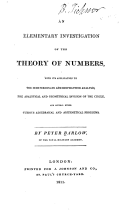2,305,843,008,139,952,128 is the Greatest Perfect Number of 1811
230(231-1) ... is the greatest perfect number known at present, and probably the greatest that ever will be discovered; for; as they are merely curious without being useful, it is not likely that any person will attempt to find a number beyond it.
Notes:
231-1 = 2147483647 is a prime number, and a number on which this number relies. The prime number is the largest value for a 32-bit signed integer. Barlow believed no prime greater than this would be discovered as there was no point.
Folksonomies: mathematics numbers prime numbers
Taxonomies:
/technology and computing/consumer electronics/camera and photo equipment/telescopes (0.577302)
/science/mathematics/arithmetic (0.536731)
/business and industrial (0.329345)
Keywords:
greatest perfect number (0.945483 (positive:0.462844)), 32-bit signed integer (0.772712 (neutral:0.000000)), prime number (0.638010 (neutral:0.000000)), largest value (0.500165 (neutral:0.000000)), Barlow (0.295848 (negative:-0.258723)), person (0.276468 (negative:-0.572777)), point (0.274926 (negative:-0.258723))
Entities:
Barlow:Person (0.961892 (negative:-0.258723)), 32-bit:Quantity (0.961892 (neutral:0.000000))
Concepts:
Prime number (0.959145): dbpedia | freebase | opencyc
Mersenne prime (0.907127): dbpedia | freebase | yago
Number theory (0.801636): dbpedia | freebase | opencyc
Perfect number (0.731119): dbpedia | freebase | yago
Natural number (0.713105): dbpedia | freebase | opencyc
Divisor (0.619055): dbpedia | freebase
2147483647 (0.614919): dbpedia | freebase
Euclid's Elements (0.604274): dbpedia | freebase | yago





